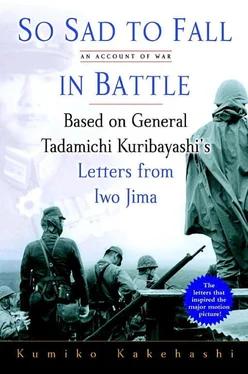There is one section, however, that has been cut from the newspaper in its entirety: the part about being “utterly empty-handed and ill-equipped.”
The agony and the frustration of soldiers who had to keep on fighting when they had no weapons and their supplies had been cut off—that is probably what Kuribayashi wanted to get across most desperately. And it is this part that has been excised.
Talking about being “empty-handed and ill-equipped” is tantamount to whining. A proper soldier never complains, no matter how hard things get, but sticks it out, keeps on fighting, and goes to his death in silence. The accepted “common sense” of the time comes through in this change.
Kuribayashi’s own text does include some of the stock phrases used by military men of the time—for example, “conscious of the Emperor’s favor, not begrudging our efforts though they turn our bones to powder and pulverize our bodies,” and “turning the defeat of the Imperial Army into victory”—so in terms of style it conformed to the formal conventions of a commander in chief’s farewell telegram. But at the same time it conjures up a vivid image of the doomed and dying soldiers having to face an overwhelmingly more powerful enemy “empty-handed and ill-equipped,” with their “ammunition gone” and their “water dried up.” What permeates the whole message is the raw grief of the commander summarized neatly in the phrase “such that even the gods would weep.”
It was this, I suspect, that alarmed the upper echelons of the military establishment.
Farewell telegrams were always sent to the Imperial General Headquarters, but they were also published in the newspapers to be read by the general public. Kuribayashi must have been aware of that. He was making an effort to communicate the heroism of his men not just to the Imperial General Headquarters, but more widely to the man in the street. High-ranking army officials, however, decided that publishing the text in the newspapers in its original form might give offense.
Right next to the article on the defeat at Iwo Jima, on the front page of that day’s Asahi Shimbun newspaper, is an article about the proposal of a special military measures bill in the legislature (National Diet). The bill gave the government the legal power to expropriate land and buildings, force individuals to perform certain necessary duties, and get unconditional cooperation from corporations in the event of a final battle against the Americans on the Japanese mainland.
At a time when Prime Minister Koiso was making speeches about “the only choice we have” being “between victory and death” and urging “one hundred million fellow countrymen… to fight together with the army, should the enemy come, and exterminate them completely,” it was hardly surprising that Kuribayashi’s message was deemed likely to undermine the morale of the people.
Kuribayashi, who had thought about becoming a journalist in his youth, wrote a letter to his wife on January 21, 1945, from Iwo Jima saying: “It’s best that you say as little as you can to newspaper journalists or anyone else like that. You must be especially careful if they ask you to show them any letters. If you’re thoughtless and end up showing them anything, it’s guaranteed it will be in the paper in no time.” Clearly, he was conscious of how he would be treated by the newspapers and other media. The last letter he wrote to his elder brother, Yoshima, on January 12, 1945, includes the following passage.
Perhaps I’m just worrying needlessly, but there is a general tendency for newspapers and magazines to cook up articles that have no basis in truth about how notable people got where they are in life. As an example, take the story that as a boy General Ugaki put himself through school by selling daikon radishes or delivering newspapers. It’s simply not the truth. These are just stories that journalists have cobbled together by distorting and exaggerating things irresponsibly.
As a boy, I was raised in the house where I was born. I then went to Nagano Middle School, progressed smoothly through the Military Academy and the Army War College, and got where I am today with help from my seniors and other people. I sincerely hope I have done nothing that could embarrass me after my death.
Despite the atmosphere in Japan in those days, Kuribayashi was able to take a cool, detached look at the way he would be placed on a pedestal after his death as “a commander in chief who had died with honor.” He knew perfectly well that the text of his farewell telegram would be published in the newspapers—and that was why he wrote what he did.
He added a jisei —a death poem in three stanzas—to the end of the farewell telegram.
Unable to complete this heavy task for our country
Arrows and bullets all spent, so sad we fall.
But unless I smite the enemy,
My body cannot rot in the field.
Yea, I shall be born again seven times
And grasp the sword in my hand.
When ugly weeds cover this island,
My sole thought shall be the Imperial Land.
In their death poems, soldiers of the Imperial Army were traditionally expected to write about love of country and devotion to the emperor. In Kuribayashi’s poem, for example, the idea in lines 5–6—“Yea, I shall be born again seven times / And grasp the sword in my hand”—is derived from “Shichishôhôkoku,” a stock phrase of the time that means “to be reborn seven times to serve one’s country.” The case can be made that Kuribayashi’s poem contains all the proper clichés that a death poem composed by the commander of a defeated army should.
But here, too, there is something different. Something we must not overlook.
“So sad we fall”—the end of the first line in the Japanese poem—is changed in the newspaper version to “mortified, we fall.”
Kuribayashi wrote that soldiers were “sad” to die for their country. Undoubtedly, he was giving honest expression to his most acute feelings, but that was not acceptable in the middle of a war on which the fate of the nation was riding.
The next day, I went to visit Kuribayashi’s family and got them to show me the real thing.
Kuribayashi’s farewell telegram had been sent to the Imperial General Headquarters, but after his death, Colonel Tanemura Sakô of the Army General Staff, who headed the Twentieth Army Corps, visited Kuribayashi’s home and presented the telegram to his wife, Yoshii, with the words: “Regard this telegram as the sacred bones of your dead husband.” From the general all the way down to the common soldier, Iwo Jima was a battleground from which the bones of none of the dead made it home.
The message was three pages long and was written in the hand of the telegraph operator who had received it. The three stanzas of the death poem were on the final page.
There was a red mark in the shape of two concentric circles at the head of the very first line—the line that had been altered. Then the word “sad” had been blocked out with a thick black line, and the word “mortified” had been written in its place. Both the black of the crossing out and the red of the circles looked fresh, bright, and new.
In this telegram there was no sign that the body of the text had been tampered with. The main text was probably “reworked” when it was published in the newspaper. The detail that caught the attention of the Imperial General Headquarters and that they felt they could not leave unchanged was the word “sad” in the death poem.
Sadaoka had told me that Kuribayashi’s farewell message was “like a sutra” for him. At the time, I had interpreted it to mean that he chanted the text whenever he thought of Kuribayashi in order to soothe his ghost. But when I compared the original version with the doctored version that appeared in the newspaper, the farewell message that I had originally thought of as having a quintessentially soldierly beauty revealed a whole new side of Kuribayashi to me.
Читать дальше












